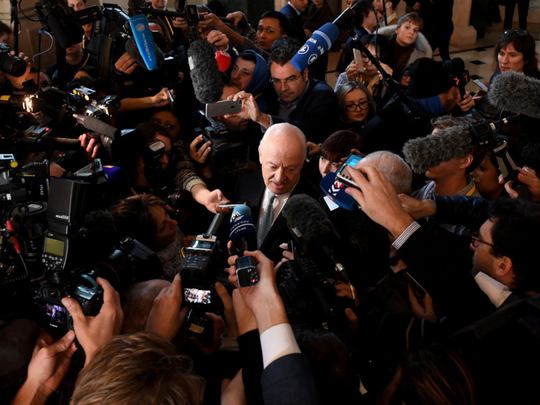
Astana: Russian-led talks on Syria ended with agreement Tuesday to bolster a ceasefire even as apparent disputes with Iran, a staunch supporter of Syrian President Bashar Al Assad, threaten to hold up efforts to end the six-year civil war.
Russia, Turkey and Iran will set up “a trilateral mechanism to observe and ensure full compliance with the ceasefire, prevent any provocations and determine all modalities” of the truce established last month, the countries said in a joint statement at the end of two days of negotiations in the Kazakh capital, Astana.
While the Astana meeting provided an effective platform for talks between the Syrian government and opposition groups, there’s an “urgent necessity to step up efforts to jump-start the negotiation process,” they said in the statement. Representatives of the Syrian armed opposition should take part in United Nations-led talks that are due to resume in Geneva on February 8, they said.
Amid deteriorating relations with the Obama administration over a failed peace effort in September, Russia seized the diplomatic initiative after its forces helped Al Assad to expel rebel fighters from Aleppo, once Syria’s largest city, last month — a turning point in a war that’s killed more than 300,000. Still, the ceasefire in Syria brokered by Russia and Turkey isn’t holding everywhere, with fighting continuing in particular near the capital Damascus.
The effort by Russia, Turkey and Iran, the three countries with forces on the ground in Syria, suffered a setback Monday when opposition groups rejected face-to-face meetings with government representatives at the talks. They negotiated instead in separate rooms, through mediators.
Iran could play the role of a spoiler in the Russian efforts to get the ceasefire on track, said a Western diplomat monitoring the Astana meeting, who spoke on condition of anonymity because of diplomatic protocol.
The Astana meeting “is a very important and symbolic step that will allow us to reach a new stage in the negotiations,” Alexander Lavrentiev, the Kremlin envoy to Syria who heads Russia’s delegation at the talks, told reporters earlier.
Tensions are increasing between Russia and Iran, which have fundamentally different ambitions in Syria, said Alexei Malashenko, a Middle East analyst at the Carnegie Moscow Centre. Tehran is determined to push home Al Assad’s advantage while Moscow wants to scale down its military involvement, he said.
“The Iranian role makes Al Assad less dependent on Russia and able to act militarily, and this is very dangerous because it undermines the Kremlin’s efforts to promote some kind of political process in Syria,” Malashenko said.
The fact that government forces continue to break the truce means “it hasn’t been implemented,” Osama Abu Zaid, a member of the opposition delegation, told reporters on Tuesday. “We are expecting more than warnings” from Russia to Al Assad and “want action,” he said.
The Astana meeting is part of a joint approach announced in Moscow last month by Russia, Turkey and Iran. While Russia and Iran support Al Assad’s regime, Turkey — a key backer of the armed groups opposing the Syrian leader — helped to negotiate the truce accord signed by seven Islamist groups representing 62,000 fighters and the Damascus government.
The opposition has welcomed Russia’s role but criticised Iran, which supports militias including Lebanon’s Hezbollah that are fighting alongside Al Assad’s forces, for continuing to support attacks in spite of the agreement to halt violence.
While the US was left out of the latest peace effort, the American ambassador to Kazakhstan attended the talks as an observer. Russia had invited aides to new President Donald Trump, who has promised to work together on combating the Daesh terror group.
There’ll be “some very hard bargaining between Russia and Iran” over the truce, according to Malashenko, the Carnegie analyst.
“The Kremlin will put huge pressure on Al Assad, but in whose interests is the ceasefire?” he said. “The opposition needs a breathing space and Russia wants the truce, but for Iran and Al Assad it’s a threat.”












